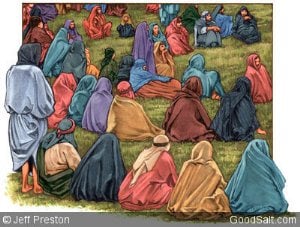Thursday: Bringing Harmony Through Involvement
There is a phenomenon that is sometimes difficult to explain but can best be described as “circular influence.” Concerning harmony and involvement, circular influence goes like this: by getting people involved you promote harmony, which in turn encourages people to become involved, which in turn promotes harmony. You can see the circular influence principle at work. It is clearly demonstrated in the old saying that those who are pulling on the oars don’t have time to rock the boat.
There were some key decisions made in the development of the early church’s organization that could have caused major conflict, but the personal preferences of the believers were submitted to what was best for the task that their Lord had given them.
Consider the important appointment process recorded in Acts 1:15–26. Although we don’t cast lots today, what key points were they looking for here, and what principles can we take from this example for the work of ministry today?
Of course, whenever human beings are working together, there is the potential for conflict. We would be right in assuming that the evil one is working to undermine the effectiveness of believers. It is only fair, then, that we briefly review an incident in the evangelistic ministry of the early church where the conflict was real.
Examine Acts 15:36–40. What caused the difference of opinion between Paul and Barnabas? What was the result of their disagreement, and what can we learn from it?
On a previous missionary trip John Mark had left Paul and his other companions and returned to Jerusalem. It seems that this incident (see Acts 13:13) made Paul reluctant to take John Mark along on this current trip. On the other hand, Barnabas saw that it would benefit both John Mark and the missionary venture to take John Mark along. Consequently, while Paul chose Silas to accompany him, Barnabas traveled with John Mark.
There was no argument regarding what missionary work should be done, and, rather than let personal differences overshadow the evangelistic task, they sent out two witnessing groups. Although Paul and John did work profitably together again (see 2 Tim. 4:11), their differences at this time were not allowed to interfere with their mission.
Think of someone with whom you might be struggling now in church? How much humility, death to self, and a willingness to forgive and to turn the other cheek will you need in order to bring reconciliation?


We follow many biblical examples. But we do not follow the method followed by the apostle to choose the 12th man. Why do we hesitate to do this? Do we not trust that the same god who manifested in the days of Apostles will not manifest the same way in our time? Why? When more than one person is nominated for any church position from GC to local church, The best way is casting lot. “The lot puts an end to quarrels and decides between powerful contenders” Proverbs 18: 18. “And they prayed and said, “You, O Lord, who know the hearts of all, show which of these two You have chosen. And they cast their lots, and the lot fell on Matthias” Act 2:24,26. If we follow this method of the apostles I think the Will of God be much clearly carried out. There is no place for human desires and will.
Conflicts of interests or opinion may arise among brethren but these must not be a hindrance on our calling to minister. Paul and John Mark did not spend time on their differences but they continued to serve God. When an opportunity to iron the difference availed, they reconciled and worked as true brethren again. May God help us not to waste time on our misunderstandings.
Bro Tivison(SA-Africa).